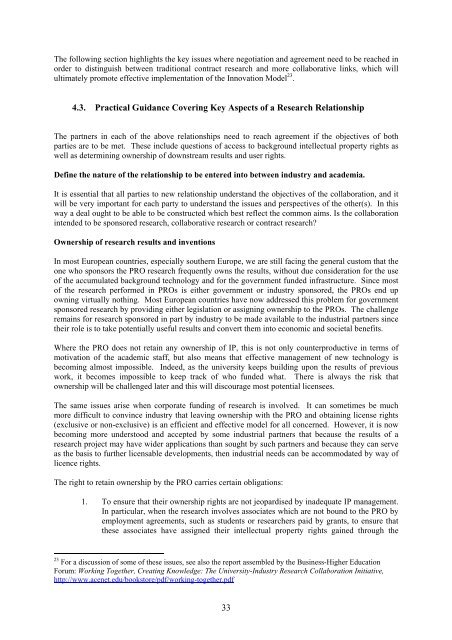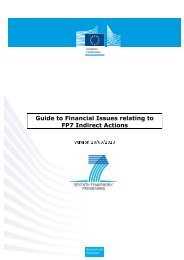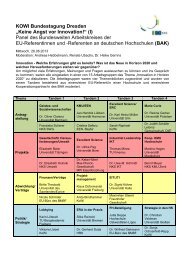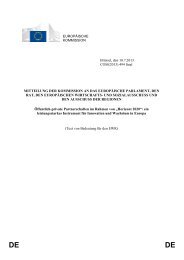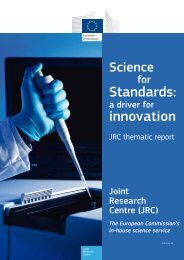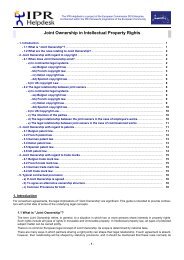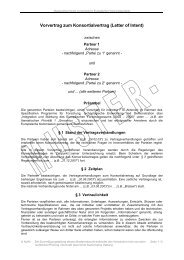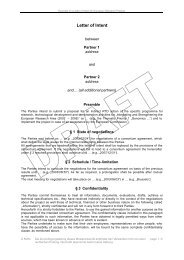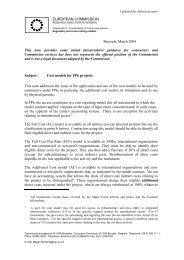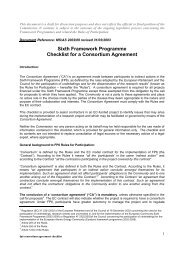Expert Group Report Management of Intellectual Property in ... - KoWi
Expert Group Report Management of Intellectual Property in ... - KoWi
Expert Group Report Management of Intellectual Property in ... - KoWi
Create successful ePaper yourself
Turn your PDF publications into a flip-book with our unique Google optimized e-Paper software.
The follow<strong>in</strong>g section highlights the key issues where negotiation and agreement need to be reached <strong>in</strong><br />
order to dist<strong>in</strong>guish between traditional contract research and more collaborative l<strong>in</strong>ks, which will<br />
ultimately promote effective implementation <strong>of</strong> the Innovation Model 23 .<br />
4.3. Practical Guidance Cover<strong>in</strong>g Key Aspects <strong>of</strong> a Research Relationship<br />
The partners <strong>in</strong> each <strong>of</strong> the above relationships need to reach agreement if the objectives <strong>of</strong> both<br />
parties are to be met. These <strong>in</strong>clude questions <strong>of</strong> access to background <strong>in</strong>tellectual property rights as<br />
well as determ<strong>in</strong><strong>in</strong>g ownership <strong>of</strong> downstream results and user rights.<br />
Def<strong>in</strong>e the nature <strong>of</strong> the relationship to be entered <strong>in</strong>to between <strong>in</strong>dustry and academia.<br />
It is essential that all parties to new relationship understand the objectives <strong>of</strong> the collaboration, and it<br />
will be very important for each party to understand the issues and perspectives <strong>of</strong> the other(s). In this<br />
way a deal ought to be able to be constructed which best reflect the common aims. Is the collaboration<br />
<strong>in</strong>tended to be sponsored research, collaborative research or contract research?<br />
Ownership <strong>of</strong> research results and <strong>in</strong>ventions<br />
In most European countries, especially southern Europe, we are still fac<strong>in</strong>g the general custom that the<br />
one who sponsors the PRO research frequently owns the results, without due consideration for the use<br />
<strong>of</strong> the accumulated background technology and for the government funded <strong>in</strong>frastructure. S<strong>in</strong>ce most<br />
<strong>of</strong> the research performed <strong>in</strong> PROs is either government or <strong>in</strong>dustry sponsored, the PROs end up<br />
own<strong>in</strong>g virtually noth<strong>in</strong>g. Most European countries have now addressed this problem for government<br />
sponsored research by provid<strong>in</strong>g either legislation or assign<strong>in</strong>g ownership to the PROs. The challenge<br />
rema<strong>in</strong>s for research sponsored <strong>in</strong> part by <strong>in</strong>dustry to be made available to the <strong>in</strong>dustrial partners s<strong>in</strong>ce<br />
their role is to take potentially useful results and convert them <strong>in</strong>to economic and societal benefits.<br />
Where the PRO does not reta<strong>in</strong> any ownership <strong>of</strong> IP, this is not only counterproductive <strong>in</strong> terms <strong>of</strong><br />
motivation <strong>of</strong> the academic staff, but also means that effective management <strong>of</strong> new technology is<br />
becom<strong>in</strong>g almost impossible. Indeed, as the university keeps build<strong>in</strong>g upon the results <strong>of</strong> previous<br />
work, it becomes impossible to keep track <strong>of</strong> who funded what. There is always the risk that<br />
ownership will be challenged later and this will discourage most potential licensees.<br />
The same issues arise when corporate fund<strong>in</strong>g <strong>of</strong> research is <strong>in</strong>volved. It can sometimes be much<br />
more difficult to conv<strong>in</strong>ce <strong>in</strong>dustry that leav<strong>in</strong>g ownership with the PRO and obta<strong>in</strong><strong>in</strong>g license rights<br />
(exclusive or non-exclusive) is an efficient and effective model for all concerned. However, it is now<br />
becom<strong>in</strong>g more understood and accepted by some <strong>in</strong>dustrial partners that because the results <strong>of</strong> a<br />
research project may have wider applications than sought by such partners and because they can serve<br />
as the basis to further licensable developments, then <strong>in</strong>dustrial needs can be accommodated by way <strong>of</strong><br />
licence rights.<br />
The right to reta<strong>in</strong> ownership by the PRO carries certa<strong>in</strong> obligations:<br />
1. To ensure that their ownership rights are not jeopardised by <strong>in</strong>adequate IP management.<br />
In particular, when the research <strong>in</strong>volves associates which are not bound to the PRO by<br />
employment agreements, such as students or researchers paid by grants, to ensure that<br />
these associates have assigned their <strong>in</strong>tellectual property rights ga<strong>in</strong>ed through the<br />
23 For a discussion <strong>of</strong> some <strong>of</strong> these issues, see also the report assembled by the Bus<strong>in</strong>ess-Higher Education<br />
Forum: Work<strong>in</strong>g Together, Creat<strong>in</strong>g Knowledge: The University-Industry Research Collaboration Initiative,<br />
http://www.acenet.edu/bookstore/pdf/work<strong>in</strong>g-together.pdf<br />
33


